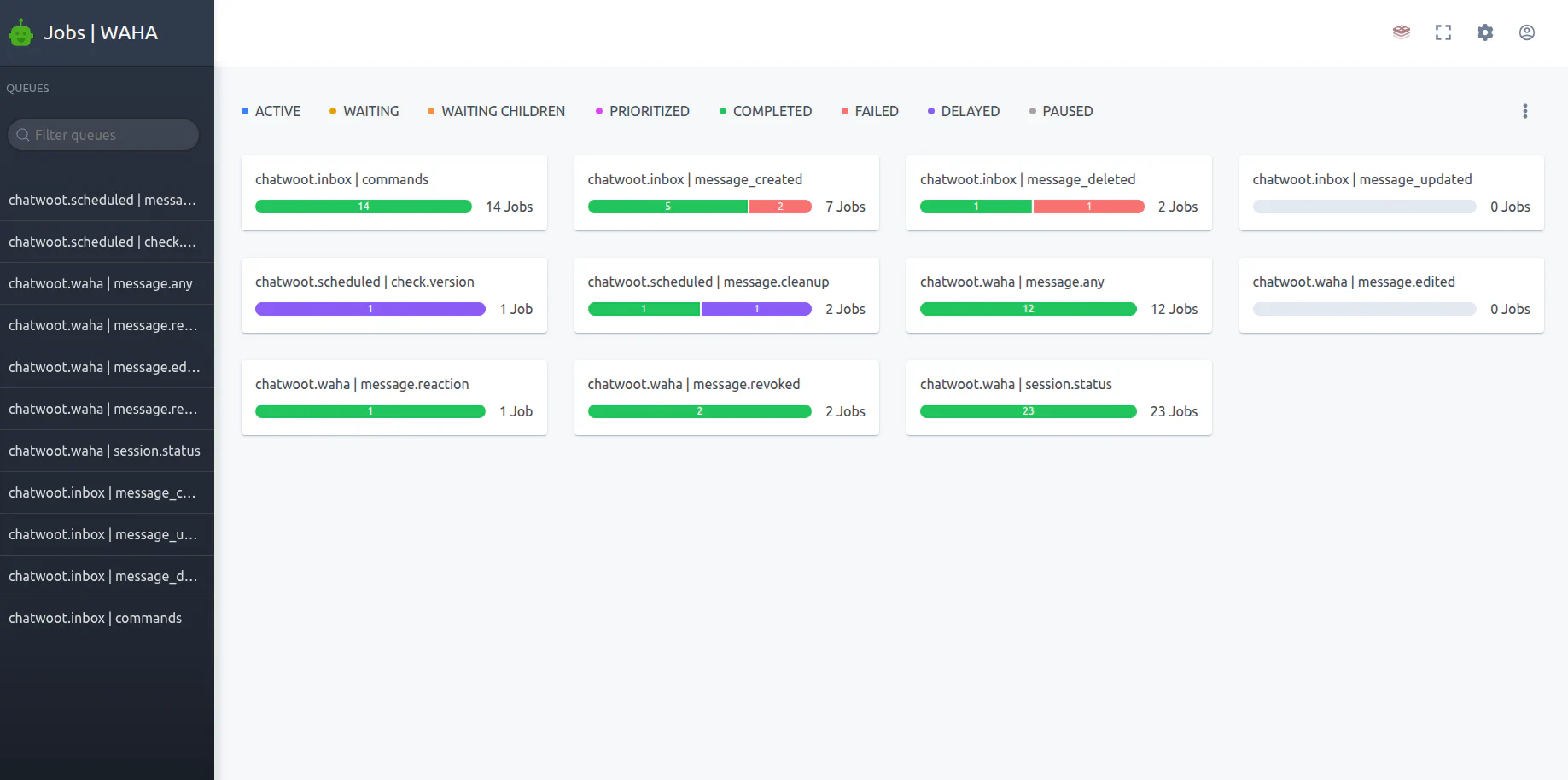Chatwoot
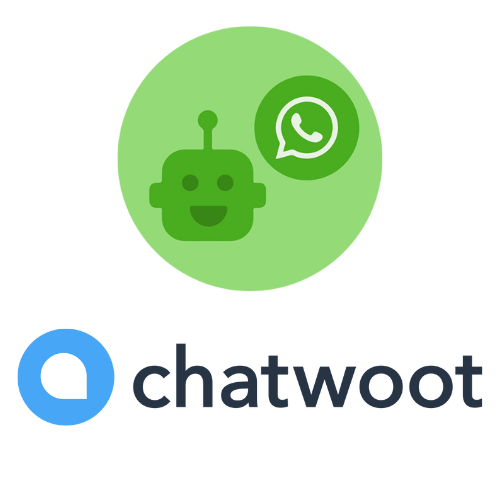
WAHA includes a built-in WhatsApp integration for Chatwoot.
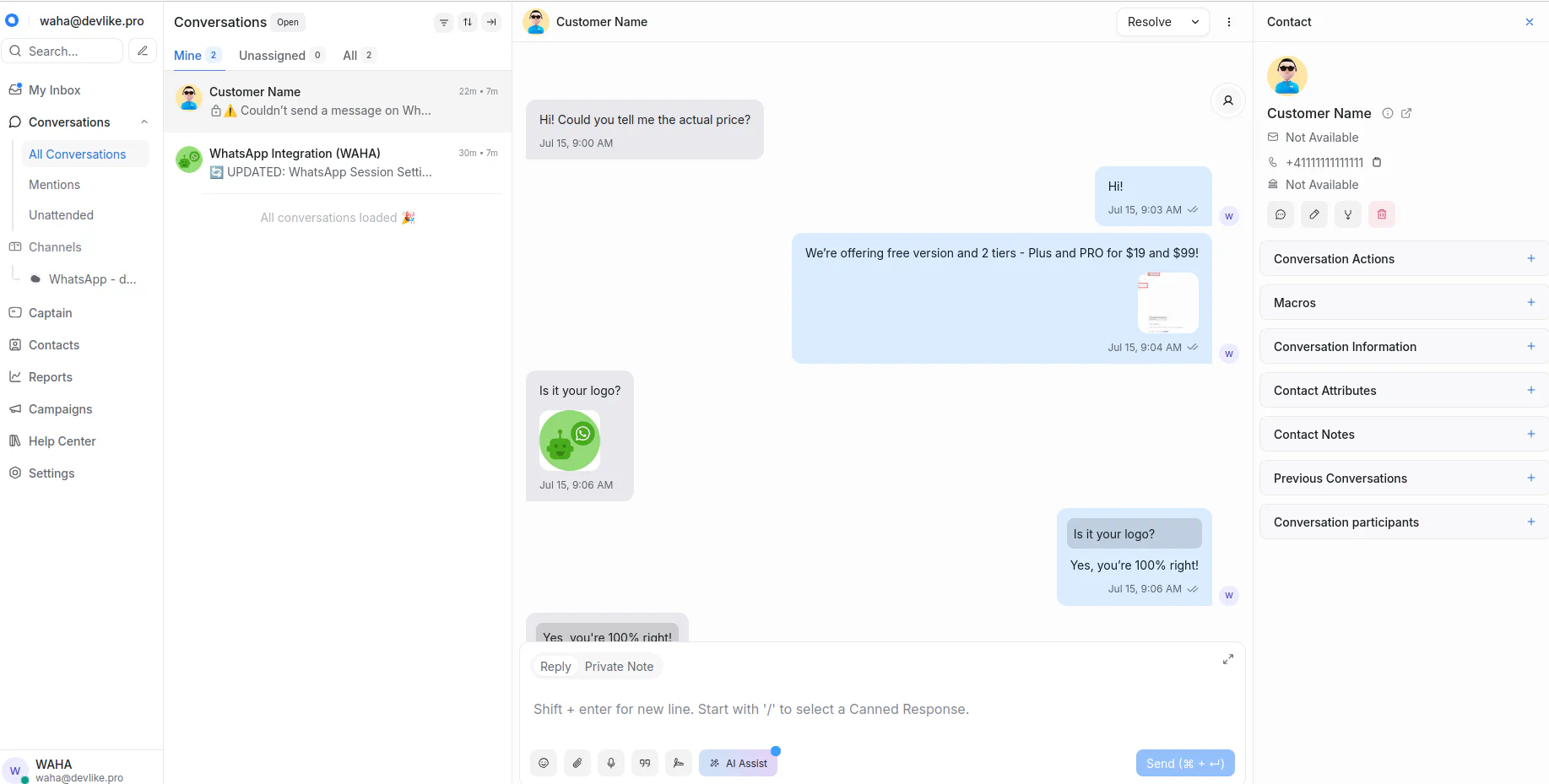
Disclaimer
This project is not affiliated, associated, authorized, endorsed by, or in any way officially connected with WhatsApp, ChatWoot, or any of their respective subsidiaries or affiliates. The official websites can be found at https://whatsapp.com and https://chatwoot.com.
For businesses seeking to integrate with WhatsApp for critical applications, we strongly recommend using officially supported methods.
Installation
We cover all installation and configuration aspects in the following series of articles:
ChatWoot Articles
Series of articles about WhatsApp and ChatWoot integration using 🧩 ChatWoot App:
You can follow them one by one or skip some parts if you don’t need them.
Configuration
To use 🧩 Apps , you MUST configure the following environment variables in addition to the standard ⚙️ Configuration:
Apps:
WAHA_APPS_ENABLED=True- Enables the 🧩 Apps functionalityWAHA_APPS_ON=calls,chatwoot- Enables only specific apps (comma-separated).- If not set, all available apps will be enabled (
chatwootrequiresREDIS_URLandWAHA_API_KEY_PLAINto be set).
- If not set, all available apps will be enabled (
WAHA_APPS_OFF=chatwoot- Disables specific apps (comma-separated).WAHA_PUBLIC_URL=https://w.example.com— the publicly available link to the dashboard (use this ifWAHA_BASE_URLis set to an internal address for Docker).REDIS_URL=redis://:redis@redis:6379- Specifies the Redis URL required for processing background jobsWHATSAPP_DEFAULT_ENGINE=GOWS- Sets the recommended engine for reliable WhatsApp automationWAHA_API_KEY_PLAIN=0000000000000000- plain password required for some Apps in environment variables- It’s a quick solution, we’re working on removing it so you can use
sha512version as inWAHA_API_KEY
- It’s a quick solution, we’re working on removing it so you can use
ChatWoot App (WAHA):
WAHA_APPS_CHATWOOT_LANGUAGES_FOLDER=/app/.languages- folder for additional languages (if language exists it’ll override templates in the original templates)WAHA_CHATWOOT_COMMAND_PREFIX-wa/{command}- prefix for commands sent from ChatWoot to WAHA (default:wa/)WAHA_CHATWOOT_MESSAGE_CALENDAR_THRESHOLD_SECONDS=600- threshold in seconds to show the calendar icon
ChatWoot App (ChatWoot):
RACK_TIMEOUT_SERVICE_TIMEOUT=60— increases the default Rack timeout to 60s (default is 15s).CONVERSATION_MESSAGE_PER_MINUTE_LIMIT=3000- important to increase if you’re usingwa/messages pullRACK_ATTACK_LIMIT=30000- important to increase if you’re usingwa/messages pull- or
RACK_ATTACK_ALLOWED_IPS={your.waha.ip.address1}
Jobs:
You can configure a background worker http://localhost:3000/jobs
WAHA_APPS_JOBS_CONCURRENCY=50- Maximum number of jobs processed concurrentlyWAHA_APPS_JOBS_ATTEMPTS=3- Number of retry attempts for failed jobsWAHA_APPS_JOBS_DELAY=0- Delay before the job starts (in milliseconds)WAHA_APPS_JOBS_BACKOFF_TYPE=exponential- Backoff strategy for retriesWAHA_APPS_JOBS_BACKOFF_DELAY=1000- Base backoff delay between retries (in milliseconds)WAHA_APPS_JOBS_REMOVE_ON_COMPLETE_AGE=259200- Remove completed jobs after 3 days (in seconds)WAHA_APPS_JOBS_REMOVE_ON_COMPLETE_COUNT=1000- Maximum number of completed jobs to keepWAHA_APPS_JOBS_REMOVE_ON_FAIL_AGE=2678400- Remove failed jobs after 31 days (in seconds)WAHA_APPS_JOBS_REMOVE_ON_FAIL_COUNT=1000- Maximum number of failed jobs to keep
Note: *_AGE parameters are specified in seconds by default.
Under the hood it uses bullmq.
API
You can use 🧩 Apps API or 🖥️ Sessions API endpoints.
POST /api/appsLatest Config in Swagger
You can find latest ChatWootAppConfig in 📚 Swagger.
{
"id": "app_RANDOMLOINGSTRING_LIKE_UUID",
"session": "default",
"app": "chatwoot",
"config": {
"linkPreview": "OFF",
"locale": "en-US",
"url": "http://localhost:3009",
"accountId": 1,
"accountToken": "CHATWOOT_ACCOUNT_OTKEN",
"inboxId": 1,
"inboxIdentifier": "CHATWOOT_INBOX_IDENTIFIER",
"templates": {},
"commands": {
"server": true,
"queue": true
},
"conversations": {
"sort": "created_newest",
"status": [
"open",
"pending",
"snoozed"
]
}
},
"enabled": true
}Conversations
You can map WhatsApp chats to Chatwoot conversations in two ways. Your Chatwoot and WAHA settings must be kept in sync.
- Single Conversation — one ongoing thread per WhatsApp chat; new messages append to the same conversation (reopens if resolved).
- Multiple Conversations — agents resolve threads; the next incoming message creates a new conversation, allowing several per contact.
Single Conversation
One conversation per WhatsApp chat (WhatsApp-like behavior). Each message goes to a single conversation. Every contact in Chatwoot has only one open (or resolved) conversation, and incoming WhatsApp messages are added to that conversation (and reopen it if it’s closed).
Set in Chatwoot:
- Inbox - Lock to single conversation - Enabled
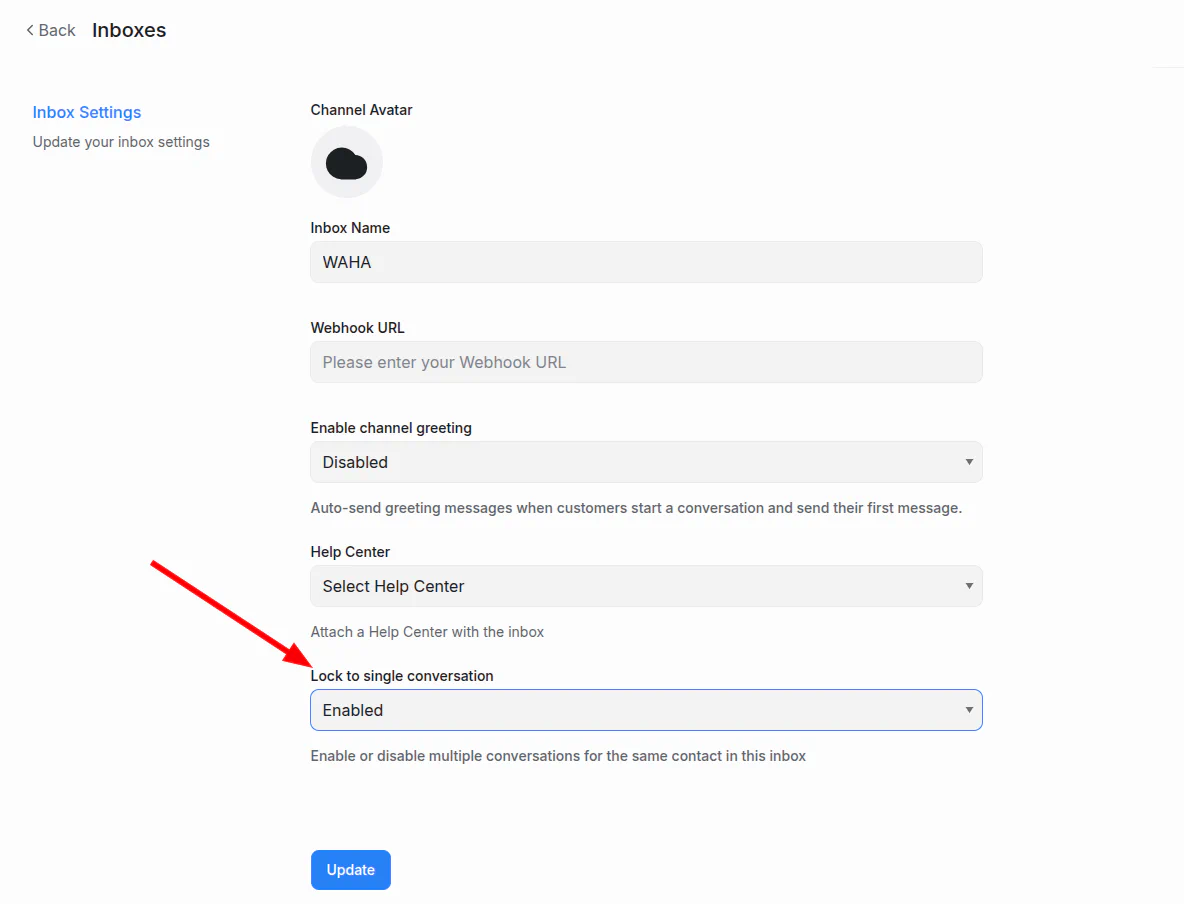
Set in WAHA:
- Select conversation behavior - Created: Newest
- Use Conversation with Status - Use Any Status
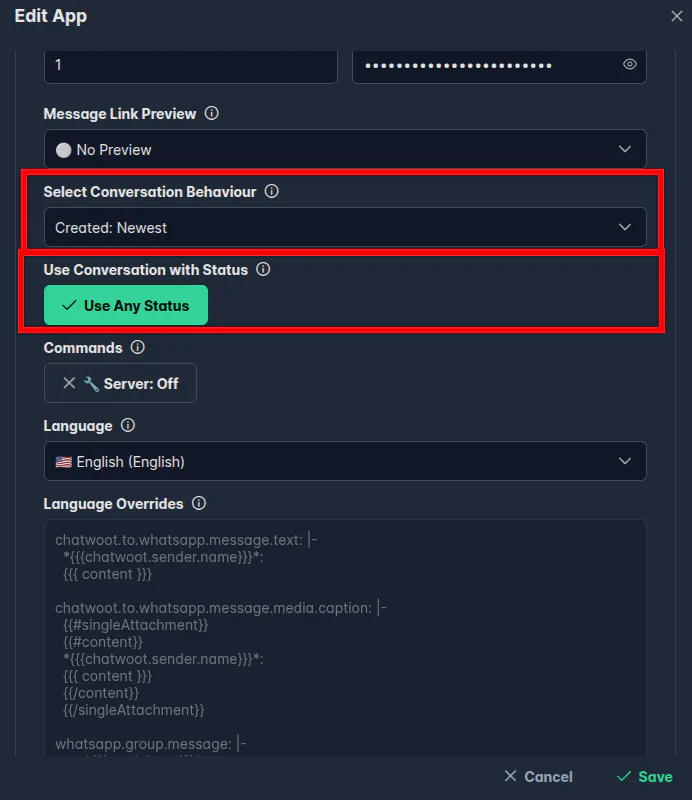
Multiple Conversations
Multiple conversations per WhatsApp chat (Chatwoot’s philosophy).
A conversation remains active until an agent resolves it. After resolution, a new incoming message creates a new conversation.
Set in Chatwoot:
- Inbox - Lock to single conversation - Disabled
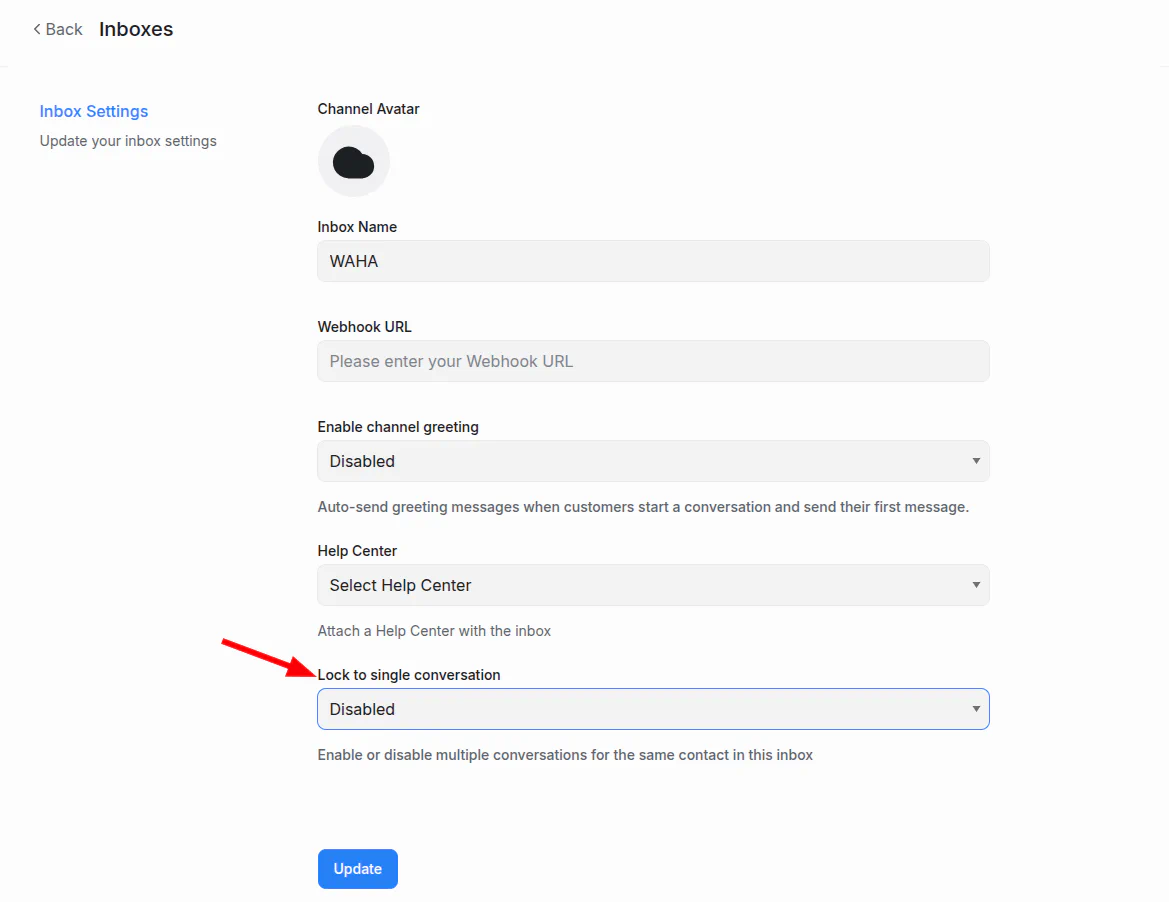
Set in WAHA:
- Select conversation behavior - Activity: Newest
- Use Conversation with Status - Use Only: Open, Pending, Snoozed
Activity Includes Conversation Status Changes
If you set Select conversation behavior to Activity: Newest, Chatwoot treats conversation status changes as activity.
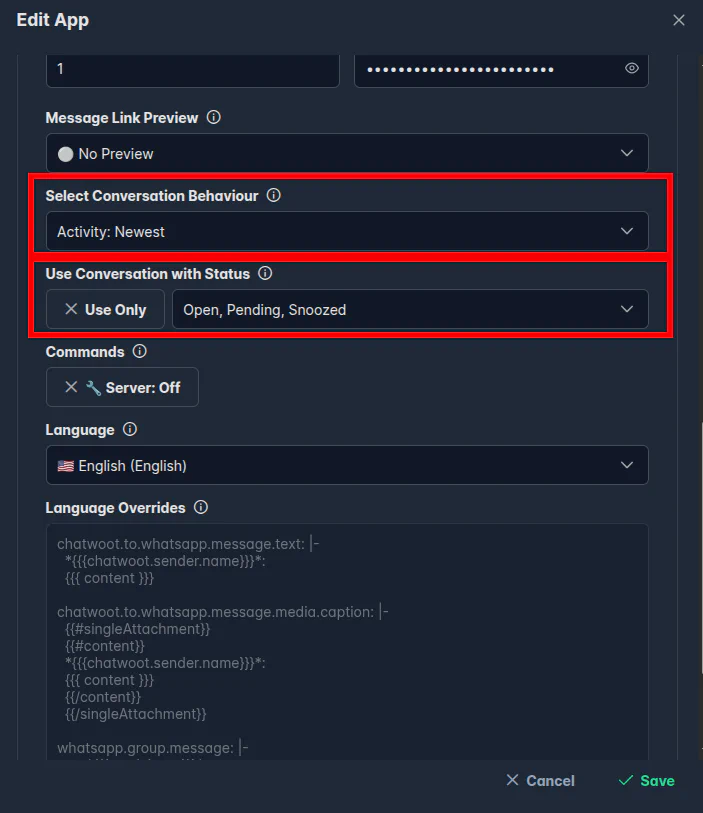
Language
You can adjust messages, templates, and branding in the content WAHA sends to Chatwoot and WhatsApp by providing key-value overrides in YAML.
What Templates Can I Override?
You can find all languages and keys in the source code /src/apps/chatwoot/i18n/locales
Per-app Language Overrides
The easiest way to test or apply a few template overrides is to use the 📊 Dashboard, then set Language Overrides:
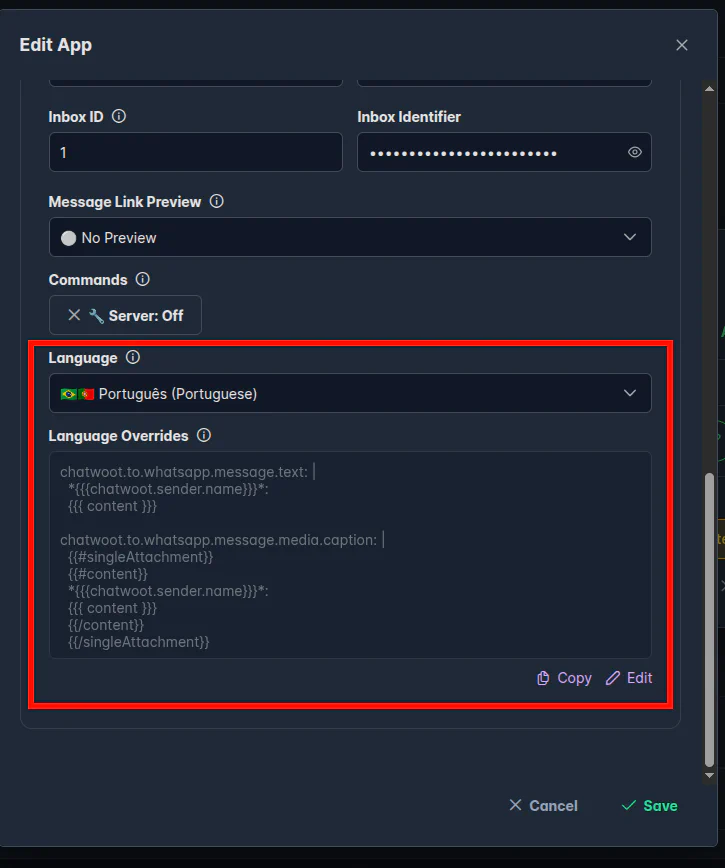
- Copy a template from Language Templates, or create your own template.
- Save the app.
- Test your changes.
Global Language Overrides
If you want to apply the overrides to all apps or add a new language, you can do this globally.
In the steps below, we assume you installed WAHA using the 🔧 Install & Update guide.
- Create the
chatwoot-languagesdirectory and download the language file you want to modify (or use as a template for a new language):
mkdir chatwoot-languages
cd chatwoot-languages
wget https://raw.githubusercontent.com/devlikeapro/waha/refs/heads/core/src/apps/chatwoot/i18n/locales/en-US.yaml- Decide what you want to do:
- To add a new language — rename the file
- To make only a few changes to the default — keep the file name
mv en-US.yaml company.yaml- Edit the file:
- If you are adding a new language, set a distinct
locale.nameand provide ALL keys - If you are overriding the default, change only the desired keys and remove the rest
vim en-US.yaml- Update
docker-compose.yamlto mount the folder with language overrides
services:
waha:
restart: always
image: devlikeapro/waha-plus
volumes:
- './sessions:/app/.sessions'
- './media:/app/.media'
- './chatwoot-languages:/app/.chatwoot-languages' # 👈 Attaches the folder
environment:
- WAHA_APPS_CHATWOOT_LANGUAGES_FOLDER=/app/.chatwoot-languages # 👈 Tells WAHA to use it as an additional languages folderTemplates
Under the hood, WAHA uses the Mustache template engine.
Below are template examples and the objects available to Mustache templates.
chatwoot.to.whatsapp.message.text
Used for any text message you send from Chatwoot to WhatsApp to render the content:
chatwoot.to.whatsapp.message.text: |
{{{ content }}}content- text from Chatwoot converted to WhatsApp Markdown
"Here's the *bold* text"chatwoot- Chatwoot’s message_created | message_updated webhook payload
{
"event": "message_created",
"message_type": "outgoing",
"content_type": "text",
"content": "Hi there!",
"sender": {
"id": 1,
"name": "Agent Smith",
"email": "smith@example.com",
"type": "user"
},
"account": {
"id": 1,
"name": "admin@example.com"
},
"additional_attributes": {},
"content_attributes": {},
"conversation": {
"additional_attributes": {},
"can_reply": true,
"channel": "Channel::Api",
"contact_inbox": {
"id": 5,
"contact_id": 5,
"inbox_id": 1,
"source_id": "83b72ca2-9bfe-4fd5-AAAA-83e9c81938f1",
"created_at": "2025-08-10T06:10:40.755Z",
"updated_at": "2025-08-10T06:10:40.755Z",
"hmac_verified": false,
"pubsub_token": "AAAAA"
},
"id": 5,
"inbox_id": 1,
"messages": [
{
"id": 222,
"content": "Hi there!",
"account_id": 1,
"inbox_id": 1,
"conversation_id": 5,
"message_type": 1,
"created_at": 1757111864,
"updated_at": "2025-08-10T10:41:04.660Z",
"private": false,
"status": "sent",
"source_id": null,
"content_type": "text",
"content_attributes": {},
"sender_type": "User",
"sender_id": 1,
"external_source_ids": {},
"additional_attributes": {},
"processed_message_content": "t",
"sentiment": {},
"conversation": {
"assignee_id": 1,
"unread_count": 0,
"last_activity_at": 1757111864,
"contact_inbox": {
"source_id": "83b72ca2-aaaa-4fd5-9118-83e9c81938f1"
}
},
"sender": {
"id": 1,
"name": "Agent",
"available_name": "Agent",
"avatar_url": "",
"type": "user",
"availability_status": null,
"thumbnail": ""
}
}
],
"labels": [],
"meta": {
"sender": {
"additional_attributes": {},
"custom_attributes": {
"waha_whatsapp_jid": "11111111111@c.us",
"waha_whatsapp_lid": "9999999999999@lid",
"waha_whatsapp_chat_id": "11111111111@c.us"
},
"email": null,
"id": 5,
"identifier": null,
"name": "Agent",
"phone_number": "+11111111111",
"thumbnail": "http://chatwoot:3009/rails/....",
"blocked": false,
"type": "contact"
},
"assignee": {
"id": 1,
"name": "Agent",
"available_name": "Agent",
"avatar_url": "",
"type": "user",
"availability_status": null,
"thumbnail": ""
},
"team": null,
"hmac_verified": false
},
"status": "open",
"custom_attributes": {},
"snoozed_until": null,
"unread_count": 0,
"first_reply_created_at": "2025-08-10T06:40:44.107Z",
"priority": null,
"waiting_since": 0,
"agent_last_seen_at": 1757111864,
"contact_last_seen_at": 0,
"last_activity_at": 1757111864,
"timestamp": 1757111864,
"created_at": 1757111864,
"updated_at": 1757111864.676595
},
"created_at": "2025-08-10T10:41:04.660Z",
"id": 222,
"inbox": {
"id": 1,
"name": "Agent"
},
"private": false,
"source_id": null
}chatwoot.to.whatsapp.message.media.caption
Used for any media message you send from Chatwoot to WhatsApp to render the caption:
chatwoot.to.whatsapp.message.media.caption: |
{{#singleAttachment}}
{{#content}}
{{{ content }}}
{{/content}}
{{/singleAttachment}}content: string- same as forchatwoot.to.whatsapp.message.textchatwoot: object- same as forchatwoot.to.whatsapp.message.textsingleAttachment: boolean- flag indicating whether the Chatwoot message has a single attachment
Language Templates
Below you will find commonly used override patterns.
Add Agent Name
Prefix all Chatwoot to WhatsApp messages with the agent name.

chatwoot.to.whatsapp.message.text: |-
*{{{chatwoot.sender.name}}}*:
{{{ content }}}
chatwoot.to.whatsapp.message.media.caption: |-
{{#singleAttachment}}
{{#content}}
*{{{chatwoot.sender.name}}}*:
{{{ content }}}
{{/content}}
{{/singleAttachment}}Chatwoot Integration Contact
Customize how the default WhatsApp Integration contact appears in Chatwoot.

It Does Not Update Existing Contacts
If you already have WAHA connected to any Chatwoot inbox, this template does not retroactively update that contact. It applies only when creating the first WAHA inbox in your Chatwoot account.
However, you can update the contact name and avatar directly in Chatwoot — WAHA searches for the contact by the
WhatsApp Chat ID attribute, which should be whatsapp.integration.
app.inbox.contact.name: |-
WhatsApp Integration (Brand)
app.inbox.contact.avatar.url: |-
https://upload.wikimedia.org/wikipedia/commons/5/5e/WhatsApp_icon.pngGroup Participant At The Bottom
You can move the “participant” part to the bottom in group chat messages

whatsapp.group.message: |-
{{{text}}}
👥 *{{{participant}}}*How it works
Apps connect WhatsApp with external services using Redis as a message broker.
Apps architecture consists of:
- HTTP API, Worker, and Session on WAHA side
- Redis acts as the central message broker.
- External Services, like ChatWoot
kroki {type=mermaid}
architecture-beta
group waha(cloud)[WAHA]
service api(server)[HTTP API] in waha
service worker(server)[Worker] in waha
service session(internet)[Session] in waha
service redis(database)[Redis]
group app(cloud)[ChatWoot]
service 3api(internet)[HTTP API] in app
api:L --> R:session
redis:R <--> B:worker
redis:T <-- B:session
3api:L --> R:api
worker:R --> B:3api
worker:T --> B:apiWhatsApp to External Service Flow:
- When a new message arrives in WhatsApp, WAHA captures it and publishes a message event to Redis.
- The Worker then picks up this event, processes it, and forwards the message to ChatWoot via its API.
- After successful delivery, the job is marked as processed in Redis.
kroki {type=mermaid}
sequenceDiagram
participant WA_Session as WhatsApp
participant Redis as Redis
participant Worker as Worker
participant ChatWoot as ChatWoot API
WA_Session ->> WA_Session: Receive a new message
WA_Session ->> Redis: 'message.any' event
Redis ->> Worker: Fire Job
Worker ->> ChatWoot: Send message via ChatWoot API
ChatWoot -->> Worker: 200 OK
Worker -->> Redis: Mark job as processedExternal Service to WhatsApp Flow:
- When a new message is created in ChatWoot, it calls the WAHA API webhook.
- The API saves this job to the Redis queue, from which the Worker retrieves it.
- The Worker then requests the WAHA API to send the message to WhatsApp.
- After WhatsApp confirms delivery, the API acknowledges the Worker, which then marks the job as processed in Redis.
kroki {type=mermaid}
sequenceDiagram
participant ChatWoot as ChatWoot API
participant WA_API as WAHA API
participant Redis as Redis
participant Worker as Worker
participant WA_Session as WhatsApp
ChatWoot ->> ChatWoot: New message created
ChatWoot ->> WA_API: Call Webhook
WA_API -->> ChatWoot: 200 OK
WA_API ->> Redis: 'message_created' event
Redis ->> Worker: Fire Job
Worker ->> WA_API: /api/sendText
WA_API ->> WA_Session: Send message to WhatsApp
WA_Session -->> WA_API: ACK: Server
WA_API -->> Worker: 200 OK
Worker -->> Redis: Mark job as processedError Handling
In case of any errors, WAHA retries a few times and then gives detailed information about the error:
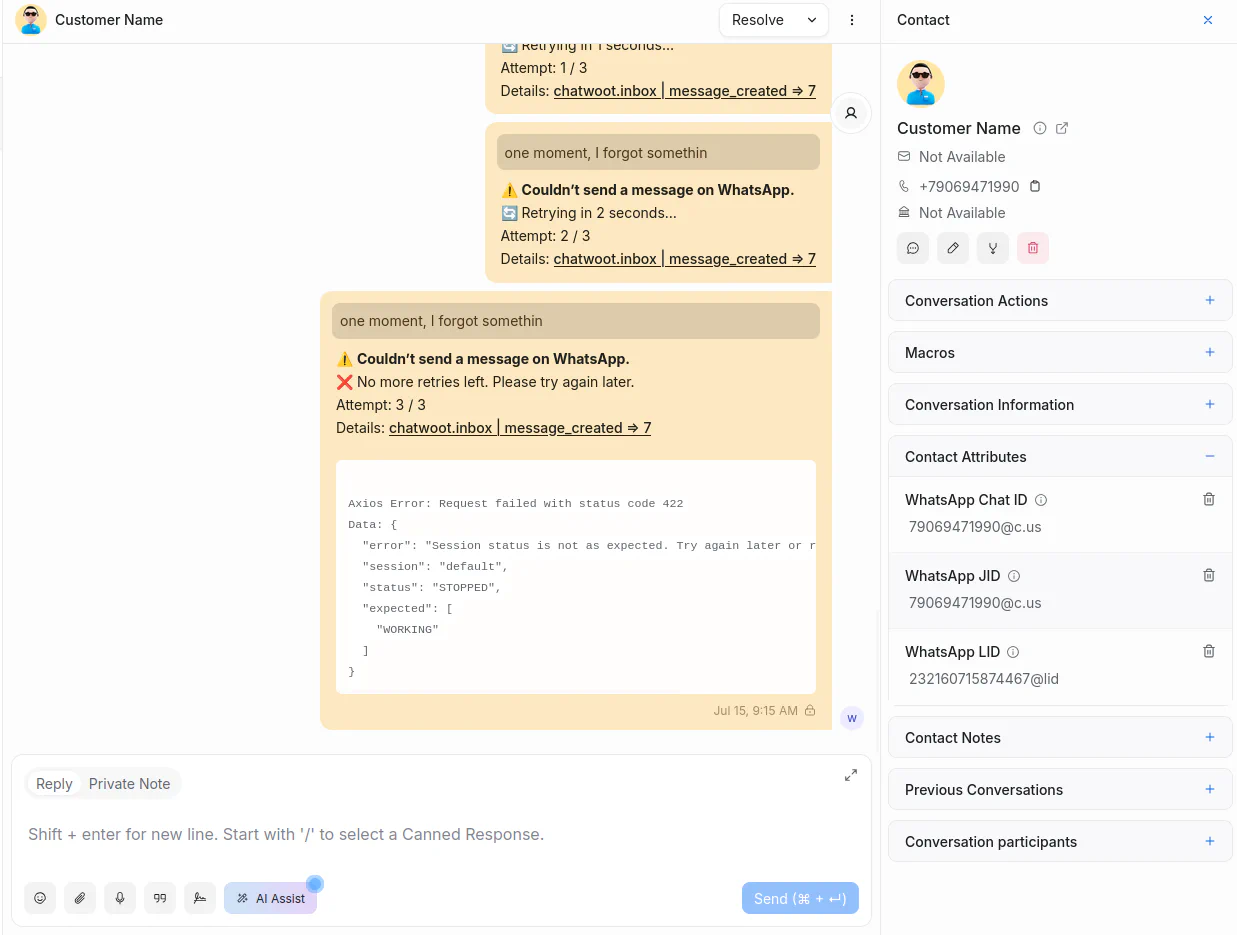
You can use the WAHA Jobs Dashboard at http://localhost:3000/jobs for monitoring:
